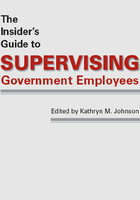
IS SUPERVISING RIGHT FOR YOU?
To know if supervision is right for you, it is important to understand your motivations. I initially wanted to supervise others because I believed it was the only way to advance in my career. I assumed my career would follow a natural progression from individual contributor to supervisor. Making more money—which is typically the case as one advances into supervisory positions—didn’t hurt either. Very quickly, though, I realized that these were the wrong reasons to want to be a supervisor. In my first supervisory position, I had to hire employees, fire employees, deal with performance issues, and work with a peer who had applied (but not been selected) for my position. After this experience, the next two positions I moved into were intentionally not supervisory positions.
Since that time, I have moved back into a supervisory position. This time, my motivations were entirely different. I truly wanted to lead others. I was ready and willing, and I even cherished the relationship building, the ups and downs of individuals’ performance, the added responsibilities, and the pressure of having all eyes on me for guidance, support, leadership, and team performance. With a change in my motivations, I’ve taken a fresh look at my role as a supervisor, what others need and expect of me, and how I can be of service to them. Supervising is a different way of contributing. I still do “real” work, but first and foremost, my priority is to enable the success of others.
The only way to know if you want to be a supervisor is to try it out. Fortunately, you don’t need to be promoted into a supervisory position to do so. Instead, look for opportunities to lead and to engage others in a variety of situations. Learn from each of these situations by taking the time to reflect on them before, during, and after the experience. Consider experimenting with supervising by:
Encouraging others. Whether it is during a team project or in the most mundane of activities, give someone words of encouragement. How exciting is it for you to provide others a little wind in their sails?
Openly discussing performance. With another individual, try to discuss the strengths of his or her performance as well as ways in which the individual could improve. If you are not currently a supervisor, consider talking openly with colleagues on project teams or peers. Provide direct, honest, helpful feedback, either positive or developmental.
Building trust. Select a work relationship that may be strained and intentionally try to build trust. Work toward a mutual, win-win situation where you both feel better about the relationship.
Recognizing others for their contributions. The act of having to think about someone else’s performance and intentionally recognize a contribution is vital as a supervisor. Provide positive feedback or a small token of recognition; perhaps nominate someone for an award.
Regardless of which activities you engage in as you try to support others and create “experimental” supervisory situations, take the time to reflect on your experience. These situations will shed light on your interests and motivations to supervise others. The insights gained from this intentional experimentation and subsequent reflection will help you determine if you are excited by the idea of supervising—or if you’re not.
More to Think About and Try
Ask yourself if you are more excited by helping others do the work or by doing the work yourself. If you like the work you are doing, what would you gain by changing your position?
Careers evolve. Being a supervisor at one point in your career does not mean you’ll choose to be a supervisor for the rest of your career. Conversely, turning down a supervisory opportunity at one point in your career doesn’t mean you can’t be a supervisor at another point in your career.